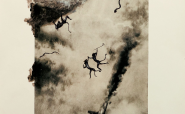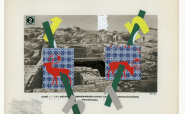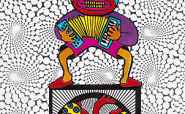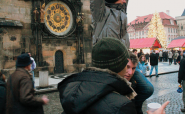| Umělec 1998/3 >> The Second Provisional (Interview with Jiří Gregor, the designated director of the National Gallery’s Modern and Contemporary Art Collection at Veletržní Palác) | Просмотр всех номеров | ||||||||||||
|
|||||||||||||
The Second Provisional (Interview with Jiří Gregor, the designated director of the National Gallery’s Modern and Contemporary Art Collection at Veletržní Palác)Umělec 1998/301.03.1998 Lenka Lindaurová | q&a | en cs |
|||||||||||||
|
Since 1995, Gregor has worked as a deputy technical manager. After Jiří Ševčík was dismissed from the position of the Palace’s director, Gregor worked as designated director for the first time. He found himself in the same position in April, after director Jaroslav Anděl was dismissed.
Are you going to explain some of the differences in economic results as presented by the National Gallery’s central economic department and by Veletržní Palác’s once the Culture Ministry is finished with its audit? The Ministry’s audit should have been over at the end of April. I do not know the results at the moment and I will not comment on any figures. I am convinced that the Ministry will comment on the audit’s results and explain the differences to the public. But how do you understand the differences as an economist? I’ve never worked in a business position at the gallery. I have worked in the technical management unit. I would like to make clear that the individual units of the National Gallery (NG) do not have their own accounting. The NG has one economic department only, headed by a deputy director in charge of economic operations. The fact is that accounting methodology has been changing in the past few years. This is due to changing laws and the Ministry’s regulations. Each of the periods is done differently and I cannot imagine that 1995 could be easily compared with 1997 when the entire National Gallery was in completely different financial position. Veletržní Palác (VP) had much more funds in 1995 but this was due to the building’s reconstruction. The difference between figures provided by the headquarters and [former director] Jaroslav Anděl occurred because of their different viewpoints. I consider the entire issue closed and I will approach my work at the National Gallery as if I’m starting at point zero. I’m trying to free myself from the past influences. During the past month I’ve been working as designated director, I feel that everything was much easier for me when I started working at the gallery in 1995. At that time I had a set goal with a set time frame and set financial resources. I was not occupied by all the other problems. Do you agree with Jaroslav Anděl’s argument that the Palace was tunneled? I would never use such a word in this situation and I will not comment on it. I am convinced that we still form one institution [with the NG] and the state funding has to be distributed within the entire gallery. There is no other way. The word tunneling is inadequate in my opinion. What is the VP’s budget for this year and are there any other sources of funding? I do not know this year’s state contribution precisely. I hope that it will be enough so that it will be possible to operate VP. I’m not worried that there will be severe cuts and the space will be open to public for two days a week only. I hope the Gallery will receive 131 million crowns ($3,740,000 US). When I subtract salaries and depreciation costs, I will have an idea how much there will be left for the individual units’ monthly operations. I know the final figure approximately but it has not been confirmed yet. I went to see the Deputy Minister in charge of economic issues and the result of our meeting was that the NG’s budget would be increased by 15 million crowns ($430.000 US). VP, however, also depends on external sources of funding, particularly trade fairs organized in the Palace’s court, and long-term and short-term leases of office space. We also have sound sponsors such as SPT Telecom and others who try to help the Modern Collection. The problem is that their sponsor activities are directed to exhibition projects only - activities that represent the Collections’ mission. Such activities do not support the Collection’s operations. Furthermore, we have to fund some of the exhibitions from our operational budget. Such is the case of the Gauguine project right now. We therefore try to boost our public relations department and hire new press department, fund raising and sponsor relations personnel. Will there be any other personnel changes? The new organizational structure was set up by Jaroslav Anděl: nothing unexpected. Nobody is leaving unless somebody wishes to. On the contrary, the Collection should hire a few people. Václav Erben now returns to the position of deputy director in charge of arts issues. Now what about the main task of the Collection: what is the exhibition plan for the rest of the year? I’m not an art historian. We have solved the issue of the deputy director for the arts. Václav Erben will be responsible for the expert side of things. One of our main projects for this year include Arnulf Rainer retrospective and Dimension Variable, a show of British art. What about some smaller and cheaper events that may make VP more alive? That is my task I got assigned by the Minister when I took my position. I think we have to make it more alive not only by organizing visual art events but also theater, dance and musical events. We will direct our activities this way and our specialist will focus on them as well. What do you think of the media exposure of the Gallery’s internal problems? Do you think that dismissing Jaroslav Anděl will damage NG’s reputation? I don’t think that dismissing anybody should damage or improve a reputation of an institution. It is not built on and doesn’t fall with one name. The thing is how the institution behaves how it presents itself to the public. But you must have noticed the media campaign that was connected with one single person... But this attention was initiated by Mr. Anděl himself. He focused on economic issues, discrepancies in economic figures and media took it over. The Gallery and the Ministry have said several times that Anděl was not dismissed because of economic reasons but professional problems. It is a problem of journalists where they look for sensations and who they think is right. Do you think that the power of Martin Zlatohlávek, the National Gallery General Director, is too excessive and the collection directors lack some of it? I think that the collection directors have enough powers. Zlatohlávek is no usurper. On the contrary, I have a feeling that he should be using more of his powers. [The National Gallery] is one institution, it has one statutory representative and some of his authority is indivisible. I don’t think I would have insufficient powers as collection director. What is your opinion on the issue of the Modern Collection’s autonomy? I agree that the individual collections should have as much autonomy as possible. Concerning the complete separation of the Modern Collection, I can imagine such a situation but I can also imagine that the collection works fine within the National Gallery. I understand that complete separation is quite common abroad. I look at it from an outsider point of view. I feel that NG is one entity and separating it into two institutions would be about something else. I don’t think that separating the Modern Collection would help it economically. The result of separating the National Gallery would be the same when it comes to funding. What do you think of the claim that Veletržní Palác is actually not suitable for the Modern Collection? I took this position knowing that I would do everything possible to keep continuous operation of the Modern Collection. Veletržní Palác does have a lot of problems, the biggest of them is the fact that its operation is very expensive. In addition, the Palace itself represents a problem for exhibiting. The space is a beautiful piece of architecture but the fact is that the exhibition areas are not very suitable for presenting modern art. It is broken up by columns, the walls are smooth, and there are platforms, pipes and low ceilings. The Minister has started a debate whether VP is at all suitable for the collection. I don’t reject such a debate but it has to be said that operation of the building is expensive and the state knows about it. I can image that another solution will be found, a new building, perhaps a new more suitable one, but again only under condition that the Collection’s continuity is secured.
01.03.1998
Рекомендуемые статьи
|
|||||||||||||





Комментарии
Статья не была прокомментированаДобавить новый комментарий